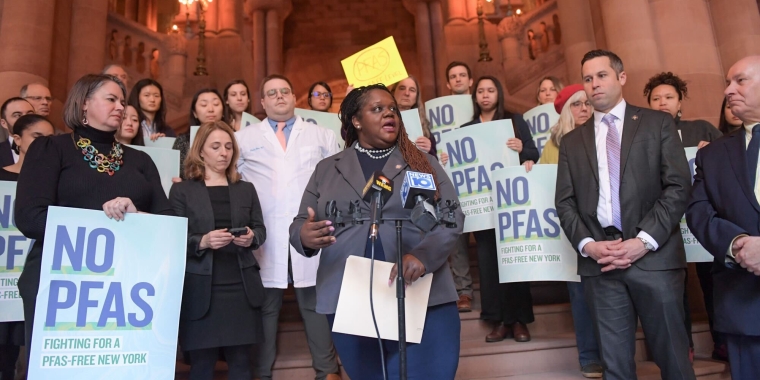
Senator Webb Joins Advocates to Urge Swift Action on Legislation to Protect New York Residents from PFAS “Forever Chemicals”
Lea Webb
February 6, 2024
-
ISSUE:
- Forever Chemicals

ALBANY, NY — Today, Senator Webb joined fellow legislators and the PFAS-Free New York coalition to call for the passage of a package of bills for the 2024 legislative session that would curb PFAS (per- and polyfluoroalkyl substances) contamination in New York State.
Three of the bills call for eliminating PFAS in key consumer and household products (A3556A/S5648-A), personal care and cosmetic products (A6969/S4265), and menstrual products (A5990/S3529), and one would point toward other sources by tracking PFAS levels in effluent released into waterways (A3296A/S227-B).
To address PFAS contamination in the environment and human bodies, it begins with eliminating these chemicals in everyday items, like cookware, dental floss, paint, tampons, and more. PFAS are known as “forever chemicals” because they are extremely resistant to breakdown, or break down into other persistent PFAS when they do; they accumulate in humans and the environment; and they move incredibly easily through the environment. New York has already passed a number of bills cracking down on PFAS, including phasing out PFAS in firefighting foam and paper-based food packaging, and most recently banned it in apparel and carpets.
Said Senator Lea Webb, “I am proud to join this coalition to raise awareness of the critical importance to protect New Yorkers from toxic PFAS or ‘forever chemicals.’ PFAS and other toxic chemicals often found in cosmetics build up in the human body and are scientifically known to cause harm, increasing our risk of cancers, reproductive issues, neurological issues, and more. Studies show that BIPOC and femme-identifying women use more of these toxic products and are the target audience for the marketing tools designed to increase their use. It is critical that we enact protections against the dangerous chemicals found in the products we use on our bodies every day, chemicals which we know can lead to devastating health impacts.”
Rob Hayes, Director of Clean Water with Environmental Advocates NY said, "Every New Yorker deserves clean, PFAS-free water. It is much cheaper to stop these forever chemicals from entering our environment rather than cleaning up pollution that's already occurred. The PFAS Discharge Disclosure Act would require industries and other permitted facilities to monitor their discharges for PFAS, so New York can take action with that data to prevent these toxic chemicals from being dumped into our lakes, rivers, and groundwater. We look forward to working with the State Legislature to pass this bill and the rest of the PFAS legislative package to move towards a toxic-free New York."
"The Sierra Club Atlantic Chapter fully supports the widespread effort to stop the exposure of humans and wildlife to PFAS - these toxic 'forever chemicals’,'" said Kate Bartholomew, Chapter Chair, Sierra Club Atlantic Chapter. "Ridding our environment of these ubiquitous toxins will improve public health and reduce the costs of healthcare and expensive filtration of drinking water. By passing the series of bills we are highlighting today, the NYS Legislature would help limit dozens of pathways of PFAS exposure for New Yorkers, offering a comprehensive way to turn off the tap on these chemicals that are extremely harmful, costly, and toxic on so many levels. We urge the Legislature and Governor Hochul to take action on this very important issue."
ADDITIONAL BACKGROUND:
PFAS are a class of man-made chemicals that do not break down in the environment and can move through soil to contaminate drinking water. Over 3,400 public water systems in New York State have tested positive for PFAS chemicals. The U.S. Geological Survey discovered at least 45% of the nation's tap water is contaminated with PFAS. PFAS exposure has been linked to a wide range of health risks, including cancer, hormone disruption, liver and thyroid problems, interference with vaccine effectiveness, reproductive harm, and abnormal fetal development.
In December alone, new public research documented that prenatal exposure to some PFAS is associated with a higher risk of childhood leukemia, some PFAS compounds can accelerate cancer migration, and PFAS exposure is linked to decreased bone health in adolescents and young adults. According to the Centers for Disease Control and Prevention, approximately 98% of people living in the U.S. have PFAS in their blood.
related legislation
Share this Article or Press Release
Newsroom
Go to Newsroom


